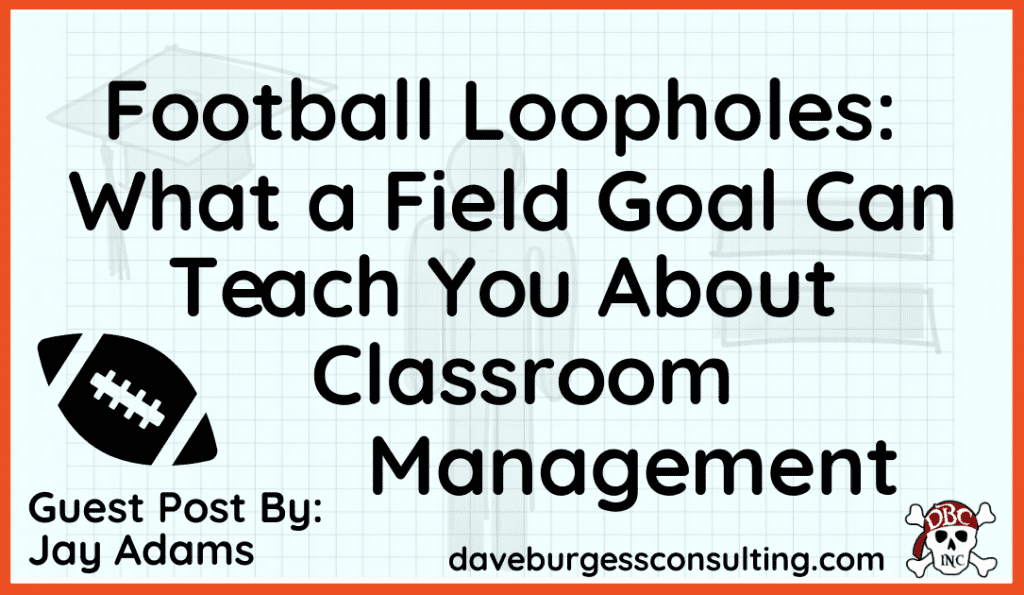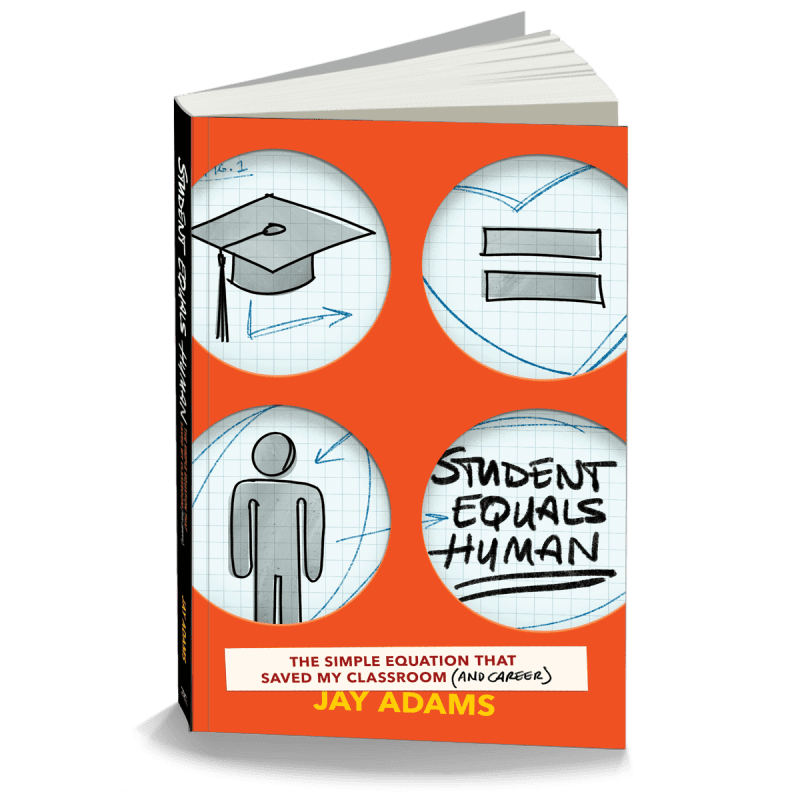Have you read our latest book, Student Equals Human by Jay Adams?!
It's incredible!
With teacher burnout and student dissatisfaction at fever pitch, Student Equals Human offers a way forward that could transform the educational system from the classroom up. With humor and empathy, Jay Adams offers teachers a method for reconceptualizing their interactions with students by counterbalancing top-down institutional imperatives with a renewed focus on the truly human connections that beat at the heart of education. Learn more about this amazing resource by clicking the link a the end of this post. But, for now...let's learn from the author.
Take it away, Jay!
Guest Post by Jay Adams
I’ve been intrigued all month by the Dec. 6 Washington - Pittsburgh NFL game. Out of timeouts, Washington QB Alex Smith was tackled with the clock winding down. Still scoreless, Washington needed to hustle the kicking team onto the field before the clock expired.
But then, Smith...just...ran off the field...with the ball. This meant that officials had to find *another* ball before they could get it spotted to start the next play. While they were trying to get a ball from the sideline, the clock hit zero. Then things got interesting. The official announced that due to the “administrative issues” with getting the ball spotted properly, they were putting :08 back on the clock.
By the time they sorted that out, the kicking team was in place. Spot. Snap. Kick. Three points. And the entire city of Pittsburgh began plotting Alex Smith’s demise.
Of course, Smith *swears* he wasn’t trying to pull anything over on anyone. He’s a stand-up guy! He was just trying to get off the field quickly so they could spot the K-ball (the ball kickers use) quickly, and it didn’t occur to him that they don’t actually place the K-ball until after the game ball has been properly spotted. And who’s to say he’s not telling the truth?
This situation, of course, is immediately familiar to anyone who’s been in a classroom for longer than 47 seconds. Smith found a loophole. There’s not *technically* a rule that says a quarterback can’t get confused about the vagaries of NFL game-ball-spotting procedures. And his excuse is at least semi-plausible; after all, he had just been in an intense situation, with lots of large, violent men trying to tackle him, and he knew the clock was winding down, and he just...forgot...to give the ball to the official.
The story illustrates a simple point about classroom management:
You will never write enough rules, with enough clarity, to remove the complexities of human free will from your classroom.
A likely response to this will be an addendum to the NFL rule: some sort of additional penalty to be assigned in this specific situation, or some extra terminology to clearly define what counts as “Delay of Game.” That clarification, of course, will create its own set of potential loopholes, which will require further clarification, infinitely branching in every direction, until we have an NFL rulebook with all the complexity of a Christopher Nolan film and none of the cinematography.
This is where bureaucratic creep comes from. I once worked in a school where the handbook grew every year, as more rules were added to cover more things we hadn’t thought about, and more definitions were added to fix the loopholes that creative young future quarterbacks had found.
It is an exhausting way to live. Moral bookkeeping drains the soul, and nit-picking, the bureaucratic approach gets in the way of relationships. No one ever had their life changed by the DMV.
So what do we do? Throw out all the rules?
Well, that would be a bit circular, wouldn’t it, if I said, “The rule is that you should get rid of the rules”? Plus, as a teacher, someone else is making most of them for you at the school or district level, I assume. So I would encourage you to simply think beyond the rule-giver / rule-follower dichotomy, embrace the messy work of relationship, and be open about that with your students.
Something I tell mine, whenever it feels like we’re veering toward Loophole Town, is this: Rules are a terrible way to ruin a relationship because once a relationship becomes defined by the existence and negotiation of rules, it’s almost definitionally broken.
Here’s an example I use to illustrate that point: I took a vow to forsake all other women when I married The Lovely Laura. Imagine if I came home and said, “Can we talk about the precise definition of the words ‘forsake’ and ‘other women’? I’d really like to hammer some things out on paper so I know exactly what behaviors are available to me.”
My instincts say it would be a less-than-stellar evening.
Or, sometimes I tell them this: Child abuse is wrong, obviously. Parents have a moral and legal obligation not to abuse their children. How would you feel if they came home and asked you to help them write down a very clear and precise definition of abuse? What if anything you didn’t specifically put on paper was fair game?
These examples help me explain something important to my students: Once we’re in the phase of negotiating the specific definition of misbehavior, something’s already really broken. In an ideal world, it should be enough to simply explain that I expect students to be decent human beings to one another, that I will model that decent humanity myself, and that things will run fairly smoothly as a result.
Come on, Jay. That’s a Naive Pipe Dream.
Some days, it is. Some students, sadly, will insist on forcing you into a bureaucratic approach. Those students break my heart, because they don’t think enough of themselves to believe how highly I think of them.
But, in general -- this approach works for me. And it works, I think because I’m open about it with the students. I tell them, “I’ve given up completely on the idea that I can write enough rules to make sure nothing ever goes wrong, so instead, I have almost no rules. Be decent human beings. Come ready to learn, or at least ready to let others learn. Thank you for being here. You didn’t have to be.”
Washington didn’t get that field goal because the NFL didn’t try hard enough when they were writing the rules. Washington got the field goal because loopholes are inevitable, and loophole-seeking is a human instinct.
It’s Winter Break, so give yourself this gift for the spring semester. Stop trying to write the perfect set of rules. It is an exhausting task that can never see success. Start talking about the importance of human decency in relationships. It’s a longer investment but much more worthy of your time and effort.
-Jay
Thank you, Jay!
Don't forget to check out Student Equals Human by clicking the link below! Learn more by following Jay on Twitter at @teacheshumans.
By clicking HERE or the button below, you can preview the book for FREE!
Student Equals Human
Leading with empathy, learning with humanity.
More info →

